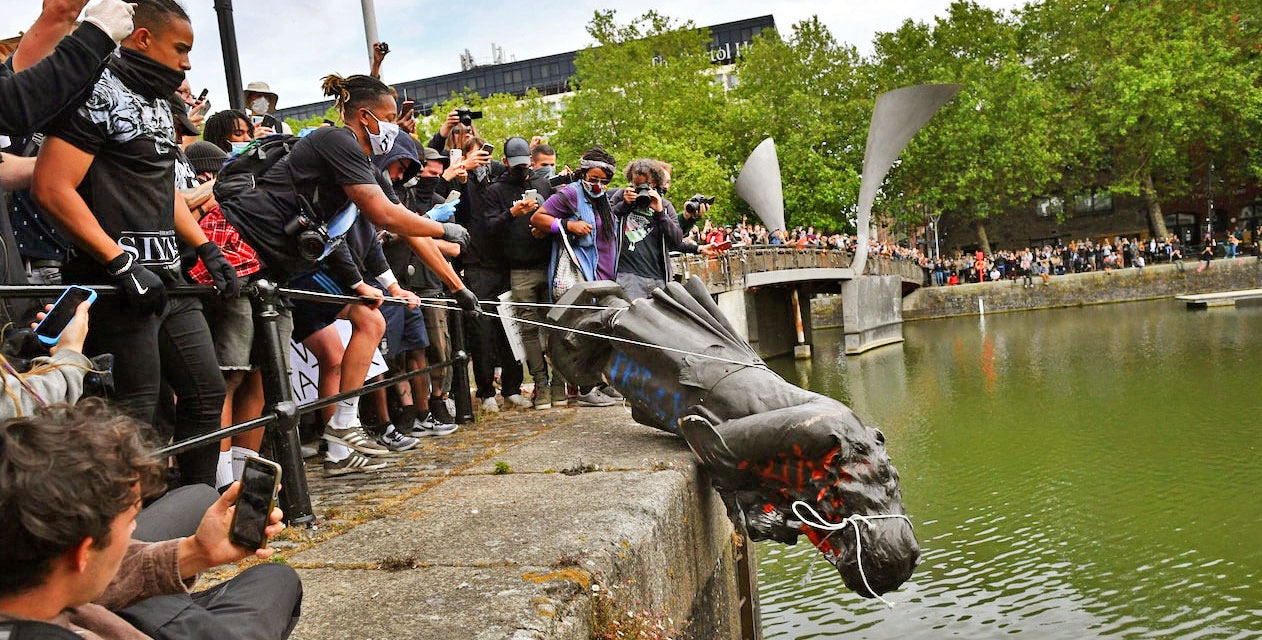Can you topple a monument and chuck it into the river because you happen to be engaged in political protest? This is the legal question which has flummoxed England’s finest legal minds until this week when the Court of Appeal, in an astonishing decision, ruled: not really.
To laymen, naïve about such things, it might have seemed like an open-and-shut case. But some of the finest minds of the English bar convinced themselves — and indeed a Crown Court judge — that the jury ought to decide whether convicting the Colston Four, as the Edward Colston monument topplers have became known, on a charge of criminal damage would inflict upon them a disproportionate “interference with their rights to freedom of thought and conscience, and to freedom of expression” under the European Convention on Human Rights. The jury took the hint, and duly acquitted.
The then-Attorney-General, Suella Braverman, asked the Court of Appeal to look at the question again, under a referral power given to her by Parliament. Much of the English bar took a dislike to her the day she was appointed — a KC compared her to a cleaner; others suggested that she was, worse yet, no better than a conveyancing solicitor. In their eyes, Braverman could do no right, so that her decision to make the reference to the Court was naturally savaged.
She was accused by MPs and lawyers alike of being an “idiot”, “shameless”, of playing politics with the law, even of threatening judicial independence. Lawyers who days previously were praising the argument advanced at the trial as “ingenious” and “novel” suddenly decided that the issues were really “straightforward” and “simple”. Meanwhile, the New Statesman gave the full-length feature treatment to one of the barristers involved — he “blew his hair from his eyes and sipped a pint of West Country ale” before carrying on the vital task of defending freedom, that sort of thing.
Almost the only criminal lawyer to publicly speak in support of the reference was Charles Wide KC, a retired Old Bailey judge. Having taken the trouble of actually going through the trial transcripts, he pinpointed several dubious features about the way the trial was conducted in a paper for Policy Exchange’s Judicial Power Project. Not only was irrelevant evidence admitted into the trial, but the defence was allowed to argue that the protesters genuinely believed they were preventing a crime by toppling the monument (the monument being ‘indecent’ or ‘abusive’), a point which the Attorney-General did not refer to the Court of Appeal because she thought the answer was so obvious.
But for all the legal obscurantism, the underlying issue is really very simple. Does the fact of being a protester, one of the twentieth-first century’s virtuous middle-class occupations, give the people the right to smash things up, as long as they were doing as part of a demo? As Professor Richard Ekins argued with typical understatement, “There are strong reasons to be concerned about a defence that effectively asserts a human right to damage or destroy property of which one disapproves, regardless of criminal law that otherwise makes this an offence.”
The answer, if the rule of law means anything, has to be a resounding “no” (the Court of Appeal suggested that de minimis damage, such as painting slogans using water-soluble paint on a pavement, is potentially protected by the ECHR).
During the hearings, counsel for one of the Bristol defendants was asked if her argument would extend to other crimes such as common assault and theft if these acts were “causally connected to the demonstration”. She had no difficulty in answering in the affirmative. In other words, freedom of expression and of assembly could be used to justify punching people, as long as those doing the punching were protesters.
Now that the Court of Appeal has rejected such self-evidently ludicrous propositions, Braverman’s critics are mostly remaining mum. From the Shadow Cabinet to the Inns of Court, an uncomfortable silence reigns: the ‘cleaner’ might, after all, have been right on the law. But those who would trash the credibility of their profession to score petty political points should not be allowed to get away with their misdeeds.











Join the discussion
Join like minded readers that support our journalism by becoming a paid subscriber
To join the discussion in the comments, become a paid subscriber.
Join like minded readers that support our journalism, read unlimited articles and enjoy other subscriber-only benefits.
Subscribe